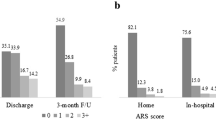Abstract
In order to investigate the relationship between cognitive function and daily used drugs in the elderly we performed an observational, cross–sectional study in 5 homes for the elderly in the region of Nijmegen, the Netherlands. Participants were 497 residents of these homes. For all these subjects the daily used drugs, classified according to the Anatomical Therapeutic Classification system, were registered and global cognitive function was measured as the total score on the Mini Mental State Examination. Adjusting for age and education, there was a small but significant and positive correlation between the use of metoprolol and the total MMSE score. The use of CNS drugs was not related to the total MMSE score. All eleven most frequently used drugs together explained 2.9% of the variance in the MMSE scores. These results indicate that there is a negligible association between daily drug use and cognitive function in these subjects.
Similar content being viewed by others
References
Potamianos G, Kellett JM. Anti-cholinergic drugs and memory: the effects of benzhexol on memory in a group of geriatric patients. Br J Psychiatry 1982;140:470–2.
Moskowitz H, Burns MM. Cognitive performance in geriatric subjects after acute treatment with antidepressants. Neuropsychobiology 1986;15:38–43 (suppl).
Satzger W, Engel RR, Ferguson E, Kapfhammer H, Eich FX, Hippius H. Effects of single doses of aldipem, lorazepam and placebo on memory and attention in healthy young and elderly volunteers. Pharmacopsychiatry 1990;23:114–9 (suppl).
Greenblatt DJ, Harmatz JS, Shapiro L, Engelhardt N, Gouthro TA, Shader RI. Sensitivity to triazolam in the elderly. N Engl J Med 1991;324:1691–8.
Tune L, Carr S, Hoag E, Cooper T. Anticholinergic effects of drugs commonly prescribed for the elderly: potential means for assessing risk of delirium. Am J Psychiatry 1992;149:1393–4.
Larson EB, Kukull WA, Buchner D, Reifler BV. Adverse reactions associated with global cognitive impairment in elderly persons. Ann Intern Med 1987;107:169–73.
Anonymous. Guidelines for ATC classification. Oslo: WHO Collaborating Center for drug statistics methodology. Uppsala: Nordic Counsel on medicines, 1990.
Folstein MF, Folstein SE, McHugh PR. Mini Mental State, a practical method for grading the cognitive state of patients for the clinician. J Psychiatr Res 1975;12:189–98.
Cockrell JR, Folstein MF. Mini Mental State Examination (MMSE). Psychopharm Bull 1988;24(4):689–92.
Steele C, Lucas MJ, Tune L. Haloperidol versus thioridazine in the treatment of behavioral symptoms in senile dementia of the Alzheimer's type. J Clin psychiatry 1986;47:310–2.
van Riezen H, Segal M. Comparative evaluation of rating scales for clinical psychopharmacology. Amsterdam: Elsevier, 1988:369.
O'Connor DW, Pollitt PA, Treasure FP, Brook CPB, Reiss BB. The influence of education, social class and sex on Mini Mental State Scores. Psychol Med 1989;19:771–6.
Magaziner J, Bassett SS, Hebel JR. Predicting performance on the Mini Mental State Examination. Use of Age-and education-specific equations. J Am Geriatr Soc 1987;35:996–1000.
Anonymous. SPSS-X Data Analysis System, Release 4.0. Chicago: SPSS inc., 1990.
Van Loveren-Huyben CMS, Van der Bom JA. Het verzorgingshuis: een toenemende bron van zorg. Tijdschr Gerontol Geriatr 1983;14:199–206.
Mann AH, Graham N, Ashby D. Psychiatric illness in residential homes for the elderly: a survey in one London borough. Age Ageing 1984;13:257–65.
Clarke MG, Williams AJ, Jones PA. A psychogeriatric survey of old people's homes. BMJ 1981;283:1307–10.
Strikwerda P, Bootsma-de Langen AM, Derghuis F, Meyboomde Jong B. Farmacotherapie in een verzorgingshuis; gunstige invloed van feed-back door de apotheker op het voorschrijfgedrag van de huisarts. Ned Tijdschr Geneeskd 1994;138:1770–4.
Lishman WA. Senile dementias, presenile dementias and pseudodementias. In: Lishman WA. Organic Psychiatry, the psychological consequences of cerebral disorder. 2nd ed. Oxford: Blackwell Scientific Publications, 1987:370–427.
Gurland BJ, Teresi J, McFate Smith W, Black D, Hughes G, Edlavitch S. Effects of treatment for isolated systolic hypertension on cognitive status and depression in the elderly. J Am Geriatr Soc 1988;36:1015–22.
Farmer ME, White LR, Abbott RD, Kittner SJ, Kaplan E, Wolz MM et al. Blood pressure and cognitive performance. Am J Epidemiol 1987;126:1103–14.
Bailey RB, Jones SR. Chronic salicylate intoxication. A common cause of morbidity in the elderly. J Am Geriatr Soc 1989;37:556–61.
Author information
Authors and Affiliations
Rights and permissions
About this article
Cite this article
Janzing, J., van't Hof, M. & Zitman, F. Drug use and cognitive function in residents of homes for the elderly.. Pharm World Sci 19, 279–282 (1997). https://doi.org/10.1023/A:1008653302673
Issue Date:
DOI: https://doi.org/10.1023/A:1008653302673



